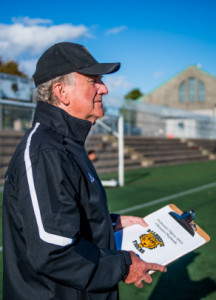
Dal football alumni Rick Rivers reflects on team’s rich history
Homecoming: the vibrant tradition of welcoming alumni back to their university family. School spirit reaches its height. Students close their books, alumni clear their schedules, and everyone gathers to celebrate their university’s past and current achievements.
But the aura surrounding Dalhousie’s homecoming is different. Students aren’t lining up outside Wickwire Field with the hopes of finding an empty seat during a brisk autumn evening. The lobster tailgate party, which originally featured a full lobster dinner, has been reduced to a lobster roll with soda and chips. Some don’t even realize homecoming is celebrated at Dal.
This is something Rick Rivers, Dal’s football team general manager and Tigers’ football alumni, wishes was different.
“I’m not trying to put anyone down here,” he said. “I belong to the black and gold. I go to soccer games, I go to basketball games, I go to volleyball games and I go to hockey games. But to me, homecoming involves football.”
Rivers’ football resume is one of, if not the most prestigious in Nova Scotia. Along with being on the coaching staff of multiple Halifax football teams, Rivers was the president of Football Nova Scotia and the vice president of Football Canada. He was recently inducted into the Nova Scotia Football Hall of Fame and the Nova Scotia Sport Hall of Fame.
“It’s all because of a passion that I have and a love of being involved in football,” he said.
Rivers wrote Undefeated Since 1976 – The Year of the Tiger, which chronicles the colourful and charismatic people and times of Dal football since its inception in 1947 to its death in 1976, and its subsequent rebirth in 2010.
Growing up in the west end of Hamilton, Rivers was raised with an immediate connection to athletics. He graduated from Hamilton Teachers’ College and spent 32 years teaching physical education in Nova Scotia.
Rivers played three years in the Canadian Junior Football League as the quarterback for the Burlington Braves, where he won a number of championships and was named MVP. He then went on to pursue his dream of playing for the Hamilton Tiger-Cats in 1968. The next year, Rivers kept on his black and gold, but this time, for a different Tigers squad. This time, he was a Dal Tiger.
“I loved it so much that 45 years later here I still am in Halifax still enjoying it,” he said.
His first game in 1969 was against the Saint Mary’s Huskies. Before arriving in Halifax, Rivers was aware of the established rivalry between the schools. Though Dal was generally on the losing end of these games, Rivers said the games were good for the community as there was a significant interest in university football. The Tigers ultimately won the game, and Rivers said the spirit at Dal was electric.
“It was crazy,” he said. “People came out of the stands, shaking your hand like they’d never done it before. It was a fun time to be here.”
Rivers attributed the team’s collapse in 1976 to a shift in the university’s priorities from football to soccer and athletic director Doug Hargreaves placing a significant importance on local talent, rather than looking out of province.
“Half of the guys [from the 1976 team] came because they were recruited and that was the thing to do,” said Rivers. “If you wanted to be competitive, you had to do that. But Hargreaves said, ‘No, I’m not going recruit. I’m going to take the local talent and build them’ and that didn’t work.”
Following the team’s cancellation in ‘76, alumni put in efforts to get the program back on its feet. Due to lack of funding and the inability to compete at a high level, the program was unable to get up and running again.
Football successfully returned after a 34-year lapse in 2010. This time, however, it was not a part of the university’s varsity program. Instead, it was a club team and received far less funding. But it was able to recommence because of funding from the alumni association and players paying $300 a year to be on the team.
“It did my heart good when we played our first game here,” Rivers said. “[Wickwire] was utterly packed.”
Rivers passion for Dal athletics makes him wish the university would place a higher significance on its sports teams.
“It’s great to be an academic school, but you can combine them both,” he said. “Having come from southern Ontario and seeing what there is at Western or Queens, and growing up UofT had fabulous football and hockey teams, but it’s never, to me, been a focus here.”
The team’s ultimate goal is to get back to Atlantic University Sport (AUS) standards. But, Rivers said, the team is not nearly prepared.
“If you would have asked me [in 2010], I would have thought at this time we would have been on our way to being in the AUS. But we’re not and that’s going to take a lot of money and recruiting.”
“I’m just happy I can be involved in getting 50-60 individuals involved in playing football at a post-secondary level.







